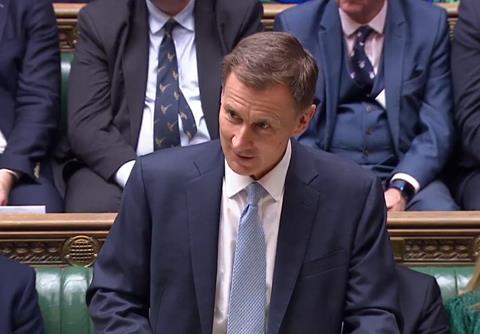
A levy on vaping is set to be introduced by the government.
Announced as part of the Spring Budget by Chancellor Jeremy Hunt, the tax is expected to be implemented by October 2026, following a public consultation on the issue.
According to the consultation, there are concerns that the current price points of vaping products make them ”affordable and readily accessible” and the duty aims to “reduce the rates of vaping among young people and non-smokers by making vaping products less affordable and therefore less accessible to these groups”.
The proposed vaping duty structure would see a duty of £1 per 10ml on nicotine-free liquids; £2 per 10ml on liquids that contain approximately the same or less nictotine (per ml) than in an average cigeratte (0.1-10.9mg) and £3 per 10ml on liquids that contain roughly more nicotine per ml than in an average cigarette (11mg or more).
The government estimated that the impact on the cost of a 10ml liquid, with a £2.50 pre-duty price, could rise up to £6.10, depending on the nicotine content.
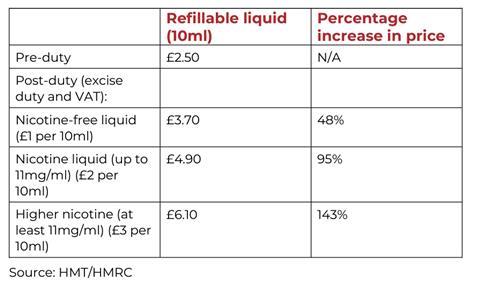
The tax on tobacco is set to increase to maintain the “financial incentive to choose vaping over smoking”.
The government recently announced that it intends to ban single-use vapes following concerns over underage usage and sustainability.
Meanwhile, the Chancellor extended the freeze on alcohol duty until February 2025. The current duty freeze was due to end in August.
Fuel duty also saw a freeze for another year, with an extension of the temporary 5p cut.
National Insurance Contributions will also be cut to 8% from 6 April 2024.
Industry reaction
Association of Convenience Stores (ACS) chief executive James Lowman welcomed support for staff. “The National Insurance cut and increase in child benefit thresholds will help the 400,000+ people working in the convenience sector and encourage more people into work, relieving pressure on an incredibly tight labour market. We heard nothing from the Chancellor today on the future path of the National Living Wage, which we urge clarity on as soon as possible to help convenience retailers prepare for expected rates in 2025 and beyond.”
The announced tax on vaping drew criticism from some sectors. Christopher Snowdon, head of lifestyle economics at the free market think tank, the Institute of Economic Affairs, called it a ”deeply cynical cash grab from the Chancellor”. “Forget sin taxes, this is a saint tax. Vapers did what the government wanted and gave up smoking. They are now being punished for it.
“This is scientifically and economically illiterate. Combined with the ban on disposable vapes, it seems the government is intent on keeping people smoking. Not only will the tax close the price gap between vapes and cigarettes, it will send a message to the public that the health risks are similar. Since most people in Britain already wrongly believe that vaping is at least as dangerous as smoking, the government’s reckless greed will cost lives. As a former health minister, Mr Hunt should be ashamed.”
On the vaping levy, Lowman said: “Retailers are trying to prepare for multiple changes to the regulation and taxation of the vaping category: a ban on disposables expected to come into effect in April 2025, a variety of as-yet undrafted regulations on the siting and marketing of products, and now the introduction of duty on vape sales from 2026. We will work with the government to try and make these various measures coherent and effective, but retailers will be feeling confused about the purpose and implementation of these regulations. Responsible retailers will also be concerned at the advantage given to illicit importers and sellers of vapes who will not pay excise duty, over legitimate businesses who will apply this tax to the price of vapes.”
CEO of vape supplier Evapo, Andrej Kuttruf, warned that it would only benefit the illiict trade. “The true winners from today’s Budget are criminals that supply the illicit market for vaping in the UK. The tax increase, without any big step up in efforts to tackle the black market through increased border controls or solving the questions of border checks between Northern Ireland, Great Britain, and the EU, will only pour petrol on the flames of the already flourishing black market and hurt legitimate retailers that follow the rules.
“The government’s decision to tax vaping liquid by nicotine strength is misguided and will likely stall, if not reverse, the UK’s declining smoking rates by making the quitting journey harder for those trying hardest to quit.”
Spring Budget: At a glance
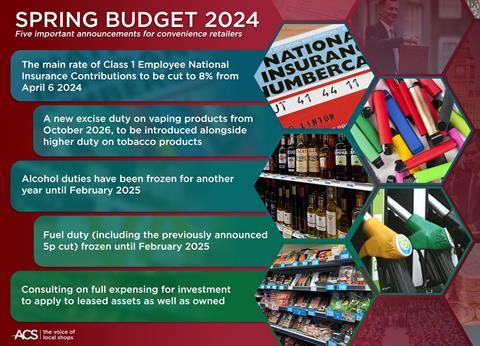

























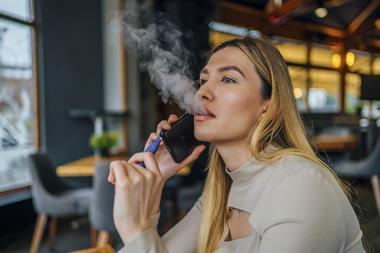
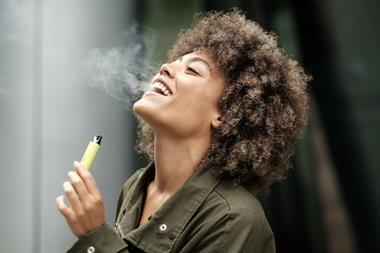
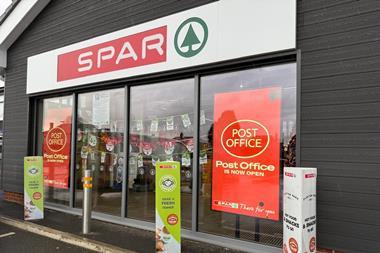




No comments yet